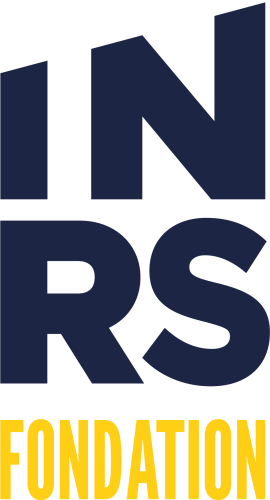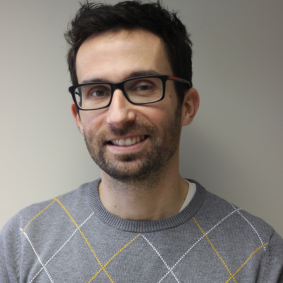David Garces-Gonçalves
PhD in Biology (2015)
Master's degree in experimental health sciences (2011)
Health Promotion Advisor, Public Health Department, Centre intégré de santé et de services sociaux de Laval
“[At INRS,] each student could be the architect of his or her own career. It was up to us to build our CV from the mosaic of experiences that INRS made available to us. It was our choice to open those doors or not.”
David Gonçalves devotes his days to ensuring that the health of Laval's population is taken into account from the perspective of health-promoting environments and adaptation to climate change. His contributions, on subjects as varied as greening, extreme heat events and the socio-ecological transition, are based on his scientific training at the Centre Armand-Frappier Santé Biotechnologie at INRS. They are part of the same spirit of exchange with various players such as the City of Laval, community organizations and other public health professional groups in Laval and other regions of Quebec.
While studying for his bachelor's degree in microbiology at the Université de Montréal, a colleague introduced him to Professor Denis Girard, an expert in immunology, inflammation and nanotoxicology. Right from the start, David was hooked. Their exchanges were dynamic, and he quickly realized that INRS is a different kind of university: “more in the lab and less in the classroom”. Even today, he emphasizes the quality of the research and training environment he found there, as well as the “enchanting and peaceful” riverside campus. He loved studying here for his master's degree in experimental health sciences (2011) and doctorate in biology (2015), immersed in the world of nanotoxicology. “It was a rewarding environment where I had a lot of autonomy. It was also a very intellectually stimulating experience,” he sums up.
He also made some memorable encounters. “I really appreciated the family spirit. Since it's not a huge place, everyone knows each other and there's no distance between researchers and students. Everyone has dinner together. He remembers that “each student could be the architect of his or her own career. It was up to us to build our CVs from the mosaic of experience that INRS made available to us. It was our choice to open those doors or not,” he asserts. For his part, he was fully committed: to the Congrès étudiant Armand-Frappier, to the Parlons sciences lecture series, where, on a small budget of beer and pizza, he and his colleagues invited renowned speakers, to the program evaluation committee, and so on.
Despite these enriching experiences, his arrival on the job market at the end of his studies differed from today's context of full employment. His experience as a poorly supervised postdoctoral researcher at a major Montreal university was inconclusive. “I had the impression that my choice of doing a postdoc to become a researcher in my own city was getting me stuck. I didn't want to find myself in my forties, with no work experience, children and no prospects”, David sums up.
He then seized various opportunities to weave the thread of his career. “I was exploring my options,” he says. As a project manager at Parkinson Québec, he works alongside Claudie Noël, another graduate of the Master's in Experimental Health Sciences (2016), with whom he worked in Denis Girard's laboratory. During these three years, he put to good use his skills in project management and conference organization, his scientific expertise in health sciences and his scientific critical sense developed during his studies at INRS. He then combined two of his interests, life sciences and space, by working at the Cosmodôme de Laval as an educational and scientific project manager.
For the past four years, he has been a health promotion advisor with Laval's public health department. He says he finds a better fit between his graduate studies and his job, which he finds varied and satisfies his curiosity. “I was hired because of my skills in toxicology to work on environmental health issues. Right now, I'm working exclusively on climate change. It's a topical and forward-looking issue. I work with and for the public... I really enjoy it,” he says.
Looking back, he feels that he acquired his ability to work “intensively” at INRS. He appreciated the diversity of tasks and courses. “The people I met there opened my mind,” he adds. Among others, he met post-doctoral fellow Jean-Patrick Toussaint, who has worked for the David Suzuki Foundation and the Fédération québécoise des municipalités, and now heads the Climate Program at the Trottier Family Foundation. “Among his achievements, Jean-Patrick has written a book on the post-graduation journey of doctoral students. It's inspiring to rub shoulders with people like him... and I've met a lot of brilliant people with similar profiles at INRS,” he points out.
He believes that the polarization of society is one of the most critical public health issues. That's why he considers it essential that science be valued at all levels in our education system. “Cynicism is reduced by valuing science and education in general. People who have had more learning opportunities often develop a better capacity for self-criticism,” he asserts.
In his early forties, he realizes that life goes by very quickly. “You have to try and combine pleasure or the quest for meaning with usefulness and efficiency,” he observes. That's why he believes that academia needs to be concerned about the future of the next generation it is training, by offering young people entrepreneurial courses and networking opportunities that will open up new possibilities. “Higher education takes six or seven years, so it has to give us added value and relevance, not just a catalog of skills,” he adds. “Life is short, trial and error is important for learning, but it's better to have these experiences sooner rather than later,” he concludes.
[Interviewed in May 2024.]

